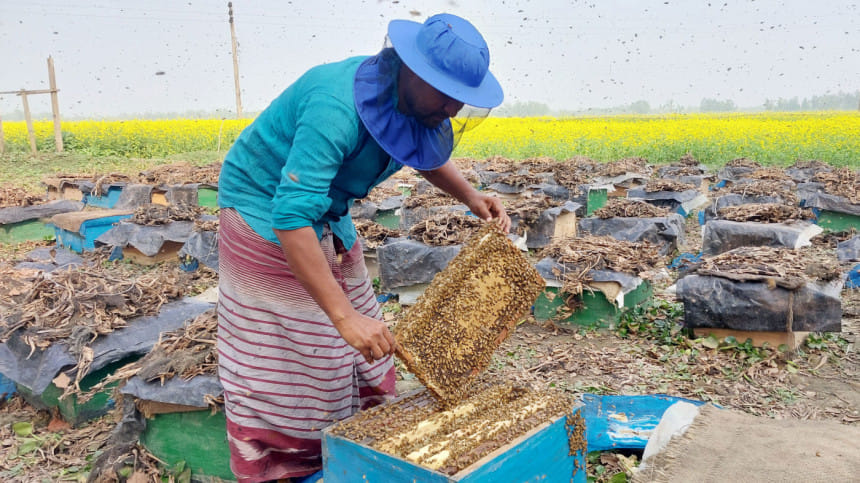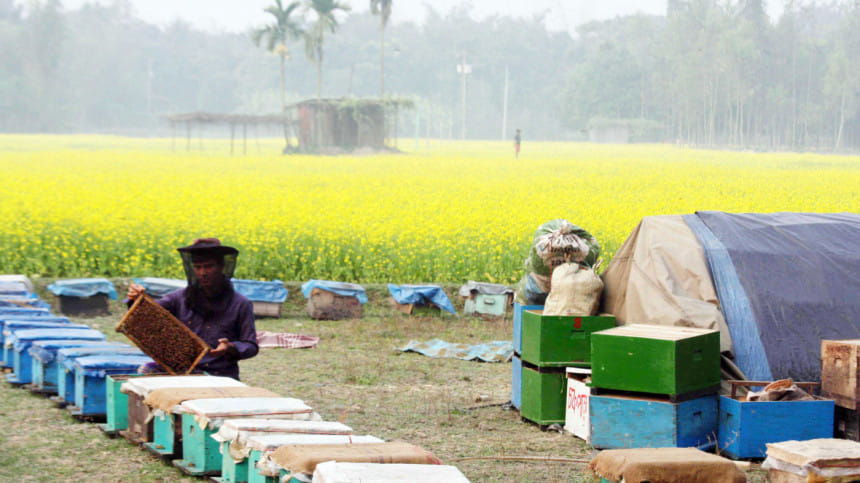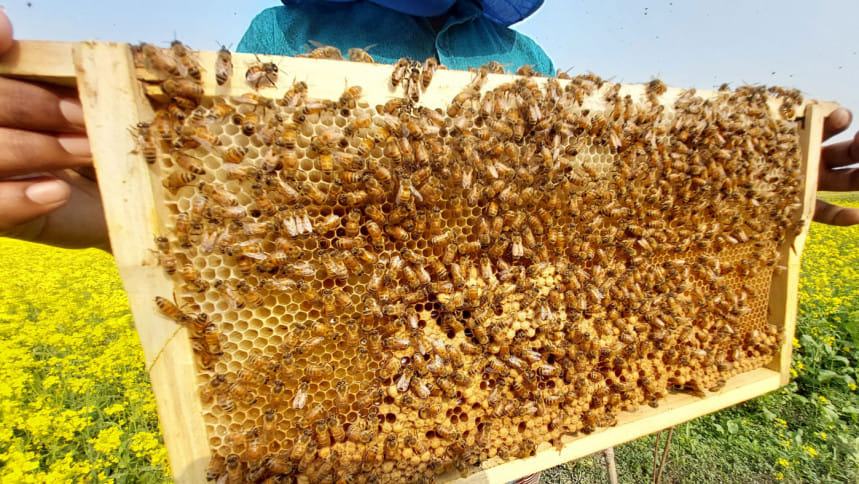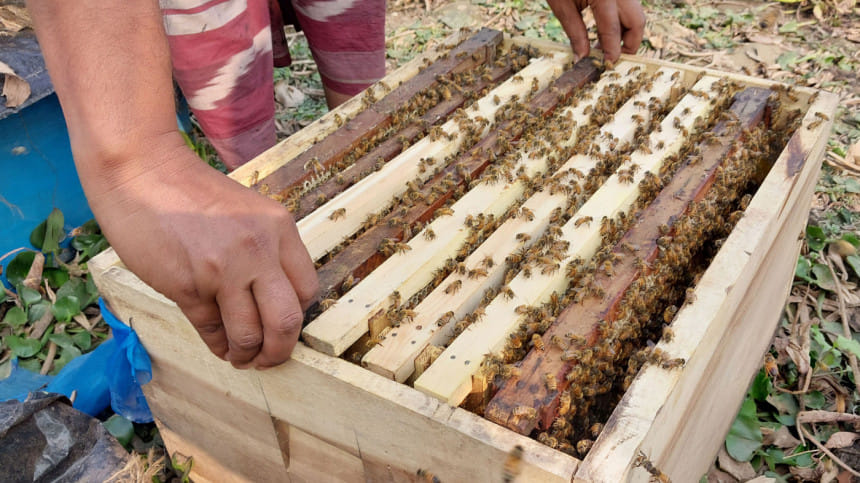No sweet yield for Tangail beekeepers

Minarul Islam, a beekeeper of Shyamnagar in Shatkhira, set up his bee colonies next to the vast mustard fields of Tangail Sadar's Gala area for the fourth time in November.
He was expecting a good yield of honey before the winter was over. But as the season progressed he soon began to worry.
Mustard flowers stay in bloom for almost three and a half months. Half way through this timeframe, the amount of honey that was supposed to be collected is far less than he had expected. He pointed his finger towards the current spell of cold wave and dense fog behind the decline in production.
At the same time, many mentioned that the price of honey is much lower than the last season.

"At this time last season I got about 100 maunds of honey from 300 colonies of Apis Mellifera bees. But this time I received only 50 maunds," he said.
"Meanwhile, last year too, the buyers (various companies and traders) paid Tk 6,000 (Tk 150 per kg) for mustard flower honey. This time, the companies for some reason appointed brokers to buy honey. They're offering us Tk 4,000. So I couldn't sell the honey," added Minarul.
This time honey production has reduced by 30 to 40 percent due to unfavourable weather conditions. On the other hand, broker syndicates and middlemen are offering Tk 4,000, instead of the fixed price of Tk 6,000 for mustard honey.

"Half the year we keep the bees alive by feeding them sugar, and the price of sugar has increased from Tk 60 per kg to Tk 120 per kg. Now if they [buyers] buy honey at a lower cost than the expense of sugar we have, we'll soon run out of business," he added.
This correspondent talked to two other beekeepers named Mohammad Jahangir from Shyamnagar in Satkhira who sits at Chhota Basalia of Tangail Sadar upazila; and Khalil Miah, a beekeeper from Kaliganj upazila of Tangail Sadar, who has set up his bee colonies in Quizbari area. They shared the same frustration as Minarul.
The beekeepers said they collect honey five times a year -- mustard flowers from the second week of November to the last week of January; from coriander and black cumin in the last week of January to the first week of March; from litchi gardens in March; from Keora, Khalisha, Goran and Bain flowers of Sundarbans between March and April; and from sesame (Til/oil seed) between May and June.

The remaining five months are off-season for beekeepers, where farmers have to keep the bees alive by feeding them sugar.
Nargis Akhtar, a sub-assistant agriculture officer of Tangail Department Agricultural Extension (DAE), said this year, mustard has been cultivated on almost 60,000 hectares of land in the district's 12 upazilas.
Last year, a total of 17,000 bee colonies were set up in mustard fields in different parts of the district and 88 tonnes of honey was produced. The same number of bee colonies has been set as a target this year. Honey production target has been fixed at 90 tonnes. About 9,000 colonies have been set up till January 1, added Nargis.
Mahmudul Hasan, additional deputy director of Tangail DAE, said, "There is a huge demand for honey in the food processing and pharmaceuticals companies of our country. Every year we import huge amounts of honey from outside the country, including India and Australia, to meet the demand."
"Sadly, our country's honey is being exported in small quantities. But we do have the potential to fulfil the domestic demand and even export it," Hasan added.

Former president of the central committee of Beekeepers Welfare Association, Dulal Hossain, said, "This time honey production has reduced by 30 to 40 percent due to unfavourable weather conditions. On the other hand, broker syndicates and middlemen are offering Tk 4,000, instead of the fixed price of Tk 6,000 for mustard honey."
Dulal said there are more than 2,500 commercial beekeepers in the country. Among them, there are more than a hundred bee farms in Tangail district, half of which produce honey commercially.
He said the country's honey farmers produce more than 3,000 tonnes of honey annually. About 1000 tonnes of honey is from mustard and litchi, and the remaining 1,000 tonnes is from various flowers and crops.
Beekeepers demanded that the government give special attention to this sector.
Contacted, Shahnaz Begum, assistant general manager of Bangladesh Small and Cottage Industries Corporation (BSCIC) in Tangail, said a few years ago, they had given training to beekeepers and a loan of Tk 25,000. But these initiatives have currently stopped.
"Many beekeepers couldn't repay those loans due to various problems. They have demanded increasing the loan to Tk 1 lakh. We've also sent the same proposal to the higher authorities but no decision has been taken yet," she added.

 For all latest news, follow The Daily Star's Google News channel.
For all latest news, follow The Daily Star's Google News channel. 







Comments